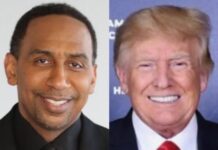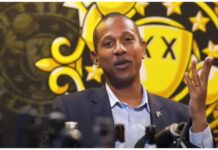
*(Via the W. E. Littlejohn Blog) – This is a common-sense, critical thinking discussion on slavery language (words or terms and phrases) and a critique of its impact on our identity with the intent to dramatically shift the historical and ongoing narrative that diminishes the value of African ancestry.
Throughout my “Uncle Tom…A Traitor – Really???!” post, readers will note asterisks (*) at the end of words and phrases “slave,” “slave trade,” “belong to/owned by” and “master.” Wherever these words and phrases are contained in the sources I quoted, I put my corrections in brackets [ ] next to slavery terminology. My corrections are what I’ve determined are more accurate descriptions of the horrific, terrifying and humiliating experiences of the hundreds of millions of Black men, women and children (my/our ancestors) swept into the abyss of the African holocaust or MAAFA (see Endnote[i])reported to have began around 650 AD when Arabs invaded and raped Africa(see Endnote [ii]) – over 800 years before Europeans’ invasion.
Slavery words and phrases have been and are repeated over and over throughout our lives. The word “slave” is in Dr. Martin Luther King, Jr.’s “I have a Dream” speech. Each year, new generations of school children repeat these words when they recite the speech while celebrating King’s holiday. “The Texas declaration of secession in 1861 contains the word ‘slave’ 18 times,” stated a character in the satirical comic series, Doonesbury.
“I don’t wanna know nutin’ ‘bout no slaves.”
Slavery terms and phrases have had and still possess profound impact on our identity as a people whose ancestry/roots are in Africa. The sting of these words was made strikingly obvious when I encountered an African American youth who was resistant to learning Black History. His disconnect was so intense, at first, I was baffled. When I inquired: “What’s up?” He declared, “I don’t wanna know nutin’ ‘bout no slaves.” The young man’s stiff resistance masked embarrassment, anger; a hint of shame. For him, to be called a “slave” is to have no respect; no value; someone who doesn’t matter. Plain and Simple.
Thus, began my quest to launch a common-sense, critical thinking discussion on slavery language and its impact on our identity.
The famously age-old adage, “sticks and stones may break my bones, but words will not hurt me,” is a lie! Indisputably, words can heal or harm. Mass media provides solid evidence of how words harm when we hear and read about teens committing suicide after reading bullies’ word-weapons targeting them on social media. (See cyberbullying.) “Words…can destroy,” Reinhart Koselleck wrote in Linguistic Change and the History of Events. Degrading labels – word weapons – are pervasive psychological slings and arrows that can violate our self-worth, and in some cases, erode people’s mental health, diminishing their quality of life. (See how words hurt at ielanguages.)
There is a “link between languages and domination” Bell Hooks wrote in her essay, Hooks on the Language of Power. She adds “…it is not the English language that hurts me, but what the oppressors do with it, how they shape it to become a territory that limits and defines; how they make it a weapon that can shame, humiliate, colonize….”
The population at which word weapons is targeted, unconsciously/ subconsciously, latch on to the definition of experiences that give colossal pain, especially when that population has been savagely torn from their home and stripped of their original heritage/identity – name, language, religion/ritual practices and meanings, and specific geographical place of origin – as were our African ancestors. Slavery language provokes and evokes in African people deep visceral and painful emotions of these losses.
The long term and ongoing advocacy of words and phrases like “slave,” “slave trade,” “master,” and “belonged to/owned by” have negatively impacted generations of Black youths’ and adults’ minds and hearts, causing a silent, emotional undercurrent of embarrassment; consequently, disconnect, as with the aforementioned young man. Slavery language/terminology is one of many examples of “biased ethnocentric euphemism[s] for conquest” (a term James W. Loewen references with regard to white supremacist vernacular) that overtly and covertly endorse and perpetuate white supremacy.
The word “slave.”
Throughout my life, I’ve refused to call my enslaved ancestors “slaves.” So, the young man’s statement – “I don’t wanna know nuthin’ ‘bout no slaves” – struck a nerve. To him and millions of Africans living on this planet, the words “slave” and “African” are synonymous. : “Slaves were brought to America from Africa” is a statement I, like children of all races, grew up hearing. We incessantly heard or read: “They were already slaves” and “Blacks are descendents of slaves.” Even filmmaker, Spike Lee, declared in an interview, “We came from slaves!”
Consequently and erroneously, the young man and millions of Black youths (as well as adults) feel their African ancestry is based solely on this noun. I have shared with youths that the noun, “slave,” could be thought of as a verb, as when a person(s) is violently forced into becoming a slave. Julian Kiganda, former designer and curator of the Freedom House Museum, Alexandria, VA, reminded readers in a Washington Informer interview that, Africans “were en-slaved, not slaves.” Unfortunately, for many, the word suggests an organic, inborn genetic/character flaw, inferring that enslavement is the victim’s fault; consequently, stigmatizing the terrorized, unwilling victim. The tentacles of that stigma have reached into the minds and hearts of tens of millions of Black people, inter-continentally.
In elementary school, I didn’t understand why I cringed each time I heard or read slavery language twisted into condemning statements. Some mystical energy inside me screamed: THAT’S NOT TRUE! Instinctively, I knew, emphatically, that my ancestors were NOT “already slaves.” That knowing energy, possibly, was/is my African DNA/genes and ancestors speaking; or, “blood memory” as playwright August Wilson stated in a PBS interview. Researchers call it cellular memory, while others say “soul memory.”
Too many of us, throughout the Diaspora, have accepted, even embraced the “slave” declarative as absolute, just as we’ve accepted that “America” was America at the time Europeans first kidnapped our ancestors. Four centuries ago, America was not “America.” So, when our ancestors were snatched from their villages in the Motherland, shipped in despicable, pressed-in conditions in the coffins of ships to Central and South “Americas” and, what is now called the Caribbean, and brutally stripped of their identity (names, religious rituals and practices and language), “America” – north, south or central – didn’t exist. What existed were European-stolen territories, called “United Colonies,” that had been savagely taken from indigenous peoples; so-called Indians. America became “America” on September 9, 1776, when the Continental Congress officially replaced the name “United Colonies” with “America.” In The Naming of America: Fragments We’ve Shored Against Ourselves, Jonathan Cohen said: “We tend not to question the factual history in the name.” Likewise, we tend not to question the authenticity of the word “slave” and the other words and phrases in slavery terminology.
This essay/article by W.E. Littlejon, continues HERE.
We Publish News 24/7. Don’t Miss A Story. Click HERE to SUBSCRIBE to Our Newsletter Now!





